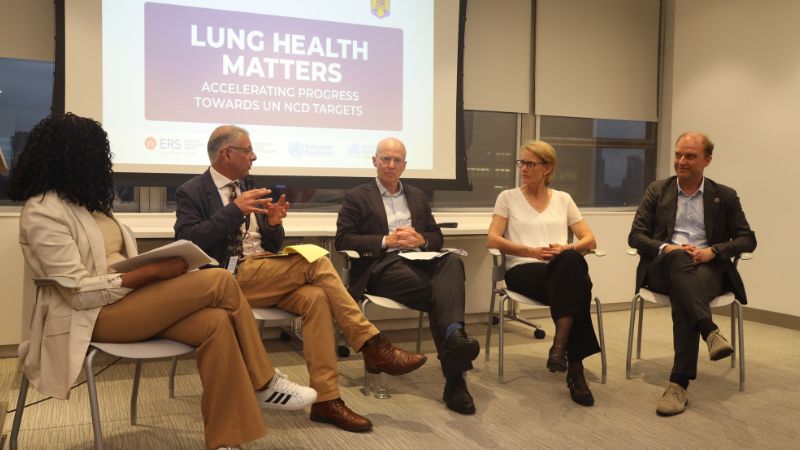8 October, 2025
ERS called for worldwide action on chronic respiratory diseases (CRDs) when it co-hosted a high-level side event during last month’s United Nations General Assembly (UNGA) 2025 in New York, USA.
The panel discussion ‘Lung health matters: accelerating progress towards UN NCD targets’ – which featured ERS Advocacy Council Chair Prof. Barbara Hoffmann – addressed the ways that UN Member States must enhance the prevention, response to, and prioritisation of CRDs. It also considered the ways that CRDs must be integrated into both primary and secondary care, and into development and environmental agendas worldwide.
Ultimately, these actions will lead to a significant reduction in premature deaths from non-communicable diseases (NCDs) and accelerate progress towards broader health coverage goals.
Prof. Hoffmann joined José Luis Castro (WHO Director-General Special Envoy for Chronic Respiratory Diseases); Kjeld Hansen (Past European Lung Foundation (ELF) Chair and WHO Civil Society Commission); Sean Maguire (Clean Air Fund), and Nick Banatvala (UN Interagency Taskforce on NCDs) for the high-level discussion, which was attended by UNGA80 delegates.
The expert panel discussed:
- The high societal costs of CRDs and their main risk factors;
- The significance of prevention, early diagnosis and intervention in managing CRDs;
- The actions that prioritise lung health and preventive measures
- How to advocate for political commitment and the mobilisation of resources to integrate CRDs within primary care;
- How to advocate for the integration of lung health into environmental policies, with a specific focus on air pollution, climate change, and tobacco use.
The event was sponsored by the Permanent Mission of Malaysia and the Government of Romania and also featured free lung function testing for all attendees, and a patient video produced by ELF that brought lived experience to the global stage.
ERS Advocacy Council Chair Prof. Barbara Hoffmann said:
“In order to alleviate the burden that respiratory diseases continue to pose on societies worldwide, the focus must be shifted from reactive treatment to proactive prevention of CRDs.
“The societal cost of CRDs is extremely high – in the WHO European Region alone, more than 80 million people are living with a chronic respiratory disease – accounting for a prevalence of over 9%. Most of these diseases could be prevented or well managed. Despite this, the societal and political response has remained low: for example, just 0.1% of the EU’s budget is dedicated to prevention, management and research on CRDs.
“This is why, against the backdrop of the UN General Assembly, we are calling for significant, decisive action and political commitment to integrate CRDs within primary and secondary care, and to integrate lung health into environmental policies.”





